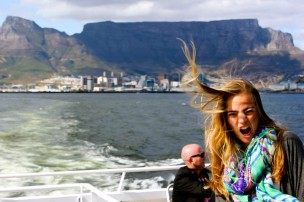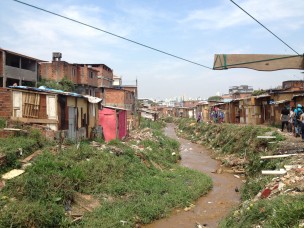Millie Dent ’15 is a participant in this fall’s Cities in the 21st Century program, part of the International Honors Program within the School For International Training (SIT). The program’s goal is to examine the natural and intentional forces affecting city development across the world, focusing on issues of urban identity, ecological sustainability, and political action.
I have learned to thrive on the uncomfortable, the awkward, the embarrassing, and the unforgettable experiences I have each day while abroad. I accept the day as it comes with no expectations, and I am usually blown away by the results.
The program is multi-country: we started out in New Orleans for two weeks, spent five weeks in São Paulo, and then headed to Cape Town for a month. We split our time there, spending two weeks in a Muslim community and then two weeks in a township.
I have had many awkward experiences, especially since we are living with homestay families in each city we visit. The second day of our homestay in São Paulo, I managed to flood the bathroom. I did not realize the drain was closed during my shower. I stepped out into about an inch of water. I ran and woke up my host mom, who unfortunately spoke little English, so I just said, “Baniero! Baniero!” Luckily she understood. After we had mopped the bathroom, I tried to mime how I had managed to do so much damage. She just stared at me. Stupid Americans. I still cringe at the memory.
Although I could tell embarrassing story after embarrassing story, I have also had my world turned upside down. Seeing a favela first-hand, I first felt embarrassment. I have read about informal settlements, studied them, and learned about NGOs working in them, but part of me never accepted their existence. I felt utterly stupid walking around, wearing a pair of TOMs, Urban Outfitters jeans, and carrying my green Orvis backpack. Kids stared at us. I stared at the ground, watching untreated sewage flow down an open sewer in the street.
After the initial shock, I became more comfortable on site visits to the favelas. By the end of our month in São Paulo, four classmates and I had come up with a project to improve sewage, electricity, and water in a favela about an hour outside of the city center called CB12. We shared the project with city officials who were planning changes in the community.
One of my best experiences in the city was meeting Djan, a leader in the pixadore movement. By day, pixadores live regular lives with typical jobs, but at night they scale buildings and sign their names at the top of each one they climb. Each has hir own written language that ze uses on each building, so nobody, including other pixadores, knows who has marked a particular building.
They do not sign for glory or fame. Their main purpose is to draw attention to the problems of non-upper-class areas that the government is ignoring. Their painting would not be considered pretty, and they do not want their designs to be associated with those of graffiti artists. Pixadores paint only in black and will not stop until the government begins to address unemployment, lack of formal housing, food insecurity, sanitation, and the rest of the major issues plaguing the city.
Living in the Bo Kaap, a Muslim community in Cape Town, I experienced major culture shock. I would wake up to the call to prayer every day at 4 a.m. and hear my host family leave the house to pray at the mosque.
We did not have classes on Eid, the Muslim New Year, so my homestay brother took me to see the annual sheep slaughter. I was a little panicked, but once I learned the tradition behind it and that the meat was delivered to poor communities around the city, I recognized the benevolence of the community and its attitude toward those in need.
Our second homestay was in Langa, a township about a 25-minute taxi ride from the city center. Some days we had breakfast; other days we had fiber bars. We rotated between hot and cold showers, never knowing when the hot water might work. We were not allowed to leave the house after dark due to safety issues. As much of a change as it was, it has been my favorite homestay so far. Members of the family I lived with always invited me on walks around the neighborhood or to a weekend braai (barbecue), constantly asking me questions and making me feel welcome in their home. I became football buddies with my six-year-old brother, Kanyeso. He taught me how to finish a pack of gum in just one morning, and I taught him how to play Hacky Sack. He would creep into my room while I was doing homework, pleading to play because he was bored. I taught him some boxing moves and he would practice while I wrote my papers.
Although Apartheid officially ended in 1994, it is still very prevalent today. Racism runs rampant throughout the city, and the inequality was clear once I stepped outside of the city center. We walked through cardboard shack communities and saw the public bathrooms that the government is supposed to maintain looted of the actual toilets, which thieves sell. Doors are ripped off of the restrooms, making it dangerous for people to use them at night, so people have to keep buckets in their homes.
The major issue facing the city is housing. The government is slowly working to provide 800,000 people with houses, but they only have the funding to aid 8,000 a year. Housing is a right guaranteed in the South African Constitution, but the government is failing the people. Food security is also promised in the Constitution, but many people are starving and others lack the funds for healthy food, causing an obesity epidemic around the country. Furthermore, South Africa has the highest rate of HIV/AIDS in the world. Once you dig deeper into Cape Town, past the usual tourist attractions of wine tours and Table Mountain, you discover the heartbreaking reality of the city.
Currently we are en route to Hanoi, where we will spend our five final weeks of the program. Nobody knows what to expect, but if it’s anything like Brazil or South Africa, we are in for another wild ride. This program has pushed me to my physical and emotional limits, opening my eyes to a world of issues I had given little thought to before.
One thing I know for sure is that I am only getting a surface view of urban issues facing these cities, and that there is a wealth of information I still have yet to understand or come in contact with. I came into the program expecting answers, but I am going to come away with even more questions, as well as the drive and passion to pursue these issues in the future.

